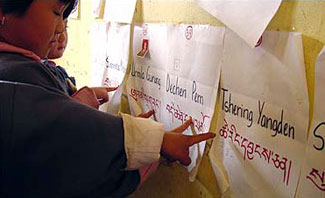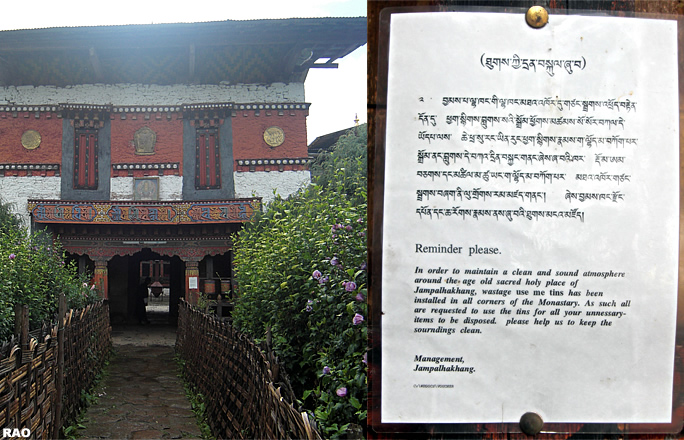|
Dzongkha:
Bhutan's National Language |
 |
Bhutan's
Culture: Dzongkha |
 |
Bhutan Information |
|
|
 |
|
Dzongkha
: Why Dzongkha is losing out to English |
 |
 |
| Learning Dzongkha takes more time than English at the initial stage |
In
the beginning, when modern education system began in Bhutan, the medium
of instruction was Hindi. English and Dzongkha took over sometime in 1966.
Four decades later most Bhutanese literates prefer to speak, read and write
more in English than in Dzongkha.
According
to the principal of institute of language and culture studies (ILCS) in
Semtokha many reasons could be attributed to what he calls the 'losing
battle'; Dzongkha is losing out to English. |
|
Presenting
his paper "Difficulty in teaching Dzongkha in an English medium system"
in the international seminar on Bhutanese studies, Lungtaen Gyatso said
that among other reasons, most students found Dzongkha a difficult subject.
"Dzongkha seems difficult not because it is a difficult subject," he said.
"The mind set is so strong that Dzongkha is compelled to appear difficult
even though it is not so."
Lungtaen
Gyatso, principal of institute of language and culture studies (ILCS) in
Semtokha, said that prior to the introduction of modern education system
in the country, monastic institutions strictly followed Dzongkha as a medium
of instruction as much as speaking Dzongkha was customary within the four
walls of Dzongs. But as modern schooling system progressed the standard
of English also began to take a noticeable stride with the introduction
of modern areas of studies like science, mathematics, geography and history.
"Over
the years English and English-related subjects kept on adding while Dzongkha
did not see much of a substantial change."
|
Dzongkha
Dzongkha literates at a glance |
 |
 |
About
28 percent of the total population is native Dzongkha speakers. |
 |
About
65 percent of the population speaks Dzongkha. |
 |
About
60 percent of the population can read and speak Dzongkha. |
 |
About
55 percent of the population can read, write and speak basic Dzongkha. |
 |
About
40 percent of the population can read, write and speak Dzongkha fluently. |
 |
About
five percent of the population can read, write and speak dzongkha professionally. |
|
Lungtaen
Gyatso's paper states that the subject ratio between English and Dzongkha
and their instructional periods is 6:2 throughout the country except at
the ILCS where it is 2:4. Of 2,880 days during a student's average 16 years
schooling, 2,529 days are allocated for English and English-related subjects
while only 351 days are allocated for Dzongkha. "Yet people expect the
standard of Dzongkha to be at par with English which is impossible in such
a situation," he said.
On
the other hand, although Dzongkha is a major subject in schools, according
to Lungtaen Gyatso, the quest of knowing it becomes far less significant
than the compulsion to pass in it. He said that despite studying dzongkha
for about 11 to 12 years in schools, majority of the students were unable
to write without many mistakes and that the standard of Dzongkha was far
poor than that of English.
Lesser
scope and opportunities and inevitable demand for English also discouraged
students from learning Dzongkha seriously. About 95 percent of the school
children took English or English-related streams and only five percent
took Dzongkha as their main mode of study after the tenth grade. Also the
demand for English literates against Dzongkha literates was very high in
almost all the work places both public and private. "Today people are not
sure of what concrete advantages they can avail from the knowledge of Dzongkha,"
he said. "So when there is a choice between the two, people naturally go
for English."
Although
Lungtaen Gyatso argued that Dzongkha as a language is not difficult, he
said that orthographically, Dzongkha is more complicated to learn than
English given its complex syllable formation which requires a firm foundation
right from the beginning. "It is not that Dzongkha is difficult than English
rather it is just opposite," he said. "But learning basics of Dzongkha
takes more time than that of English. Once one has a sound foundation of
the basics mastering Dzongkha is easier than mastering English." For example,
a beginner English learner can learn (and is taught) construction of different
words immediately such as a-p-p-l-e=apple.
But
in Dzongkha there are so many other intricate steps before a learner is
ready to construct words. "The different aspects of letter combination
take quite a good deal of time to digest. This is where the learning pace
of Dzongkha becomes slow and takes more time than learning English in the
initial stage," he said. "The Dzongkha teaching/learning has overlooked
this crucial difference and has tried to adopt the same English teaching
method to teach Dzongkha."
Considering
various factors against Dzongkha becoming at par with English, Lungtaen
Gyatso says that the possibility of considering Dzongkha as the medium
of instruction for technical subject areas is very vague at least in the
near future. He says that study areas like science, geography, and mathematics
cannot be taught in dzongkha since it cannot handle these technical subjects
and that Dzongkha does not have a major share in the Bhutanese information
world.
The
author suggests a radical shift in the teaching approach of Dzongkha. "We
have to use a very scientific and a systematic way of teaching the subject
to the students," he said. This means going back to the conventional way
of teaching "where word by word and syllable by syllable sort of recitation
existed". "At the moment, the methodologies in teaching English and Dzongkha
are the same. But Dzongkha is completely different from English, so when
the culture differs the approach of teaching should also be different,"
he said. He also suggested increasing contact hours in schools, reinforcing
effective assessment and evaluation encouraging use of Dzongkha in offices
and most importantly creating a Dzongkha atmosphere.
With
the kind of education system that is in place in the Kingdom, English will
remain in the forefront, said Lungtaen Gyatso, always ahead of the national
language. "Efforts should be made to enable Dzongkha receive more importance
because every native language is the best medium of communications to relay
local and indigenous thoughts and values," he said. "Dzongkha is a language
of Bhutanese religion, philosophy and culture and no language can better
understand and interpret what is unique to Bhutan."
| Information on Bhutan |
 |
| Links |
 |
 |
 |
External
Links |
|




